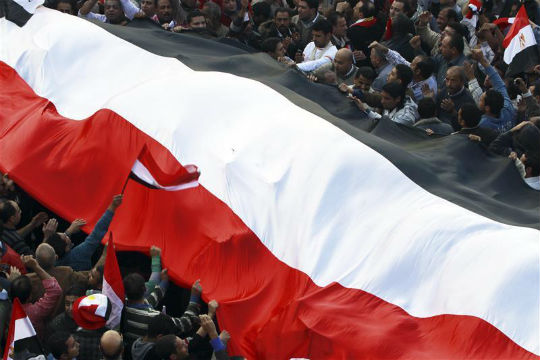Latest NEWS
- Aswat Masriya, the last word
- Roundup of Egypt's press headlines on March 15, 2017
- Roundup of Egypt's press headlines on March 14, 2017
- Former Egyptian President Hosni Mubarak to be released: lawyer
- Roundup of Egypt's press headlines on March 13, 2017
- Egypt's capital set to grow by half a million in 2017
- Egypt's wheat reserves to double with start of harvest -supply min
- Roundup of Egypt's press headlines on March 12, 2017
U.S. regrets Egypt walk-out at nuclear talks

Egypt post-revolution - Amr Dalsh/REUTERS
By Stephanie Nebehay
GENEVA, April 30 (Reuters) - The United States said on Tuesday it regretted Egypt's decision to walk out of U.N. talks on non-proliferation and still hoped all sides would agree to hold a conference on banning nuclear weapons in the Middle East.
Egypt withdrew from nuclear Non-Proliferation Treaty (NPT) talks in Geneva on Monday in protest at what it called the failure to implement a 1995 resolution for a Middle East free of nuclear weapons - an implicit criticism of Israel, believed to be the only nuclear-armed country in the region.
"We regret the Egyptian decision to leave the NPT Preparatory Committee meeting. It does not affect the U.S. commitment to convening a conference on a Middle East zone free of weapons of mass destruction," Thomas Countryman, U.S. Assistant Secretary for International Security and Non-Proliferation, who heads the U.S. delegation, told Reuters.
"We will continue to seek practical means to bring the parties together. We remain prepared to assist in any way requested, but leadership must also come from states of the region," Countryman said in comments sent by email.
The conference, which was supposed to be held last December in Helsinki after being agreed at NPT talks in 2010, was postponed a month before without a new date being set.
Western countries have voiced hope during the two-week session that the delayed conference could be convened this year.
Iran and Syria called last week for a conference on banning nuclear weapons and urged major powers to stop helping Israel acquire nuclear technology.
Egypt said it pulled out of the talks "to send a strong message of non-acceptance of the continued lack of seriousness in dealing with the establishment of a nuclear-free zone in the Middle East".
Israel has not ratified the 1970 NPT and therefore is not attending the Geneva session which ends on Friday.
U.S. and Israeli officials have said a nuclear arms-free zone in the Middle East could not be a reality until there was broad Arab-Israeli peace and Iran curbed its nuclear programme, which Tehran denies has a weapons dimension. (Editing by Robin Pomeroy)










